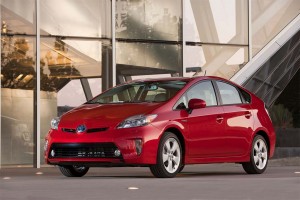Toyota is developing a new hybrid system that is smaller, lighter and more efficient than the current version in effort to keep pace with technical changes in the auto industry. It expects the system to deliver at least 10% better fuel economy in the next-gen Toyota Prius.
But the Japanese giant also sees opportunities with other alternative-power technologies, notably hydrogen. Toyota plans to unveil a new fuel-cell vehicle next January that it will put into production in 2015.
“Hybrid is a technology for the future and for the next 20 or 30 years,” said Satoshi Ogiso, the executive responsible for Toyota’s hybrid business, during a media briefing session on the company’s alternative power plans.
Since Prius debuted in 1997, Toyota has launched 23 different hybrids in markets around the world, the executive noted during the event in Ypsilanti, Michigan, the first time the Japanese automaker showed off its entire hybrid fleet in one place.
(Obama Administration preparing to re-start controversial alt-power car loan program. Click Here for more.)
Ogiso declined to offer a specific date for bringing the next generation hybrid system to market. However, Toyota has had new hybrid systems ready to go every six years since 1997, he noted. Thus, if it held to that schedule it would be ready sometime in 2015.
The timing could prove significant. Toyota is now the global leader in the sale of hybrid vehicles but it is facing a wave of new competitors. Despite its own problems with lower-than-expected mileage, Ford Motor Co. has eaten into its Japanese competitor’s share this year, Prius sales slipping despite the overall surge in the U.S. market.
Honda, meanwhile, is out to challenge its long-time rival with the ongoing rollout of its own new hybrid family, including a low-cost single-motor system, a more advanced two-motor hybrid, and a sophisticated and performance-oriented three-motor drive targeted for such models as the reborn Acura NSX.
(Range Rover launching plug-in diesel-hybrid. Click Here for that story.)
There have been hints that Toyota with the next-generation Toyota will upgrade its oft-criticized interior and address other concerns. But fuel efficiency will remain the top priority.
“These new hybrid powertrains will deliver significantly improved fuel economy in a more compact package that is lighter in weight and lower in cost,” Ogiso said, adding that, “When the next generation Prius arrives, it will begin a new era for a broad range of Toyota and Lexus vehicles by marking the arrival of a substantially improved family of hybrid powertrains.”
The new Toyota hybrid system “will reflect significant advances in battery, electric motor and gas engine technology,” emphasized Ogiso, who noted Toyota has a “deep commitment to electrification,” with active research programs in all three areas. He foresees the new system using batteries that are smaller because they achieve higher density than the current system.
That goal suggests that Toyota will migrate away from the time-tested nickel-metal hydride batteries it has been using since the first Prius appeared in favor of the more advanced lithium-ion batteries increasingly favored by competitors — but Toyota officials would not discuss specific technical details of their next-gen hybrid system.
(Automakers to double number of diesel models in US for 2014. Click Here for the story.)
Between now and the end of 2015, Toyota plans to introduce 15 new or redesigned hybrid vehicles globally. Bob Carter, Toyota Motor Sales executive vice president, said the sale of 5 million Toyota and Lexus hybrids worldwide has led to a 34-million ton reduction in C02 – with savings of 3 billion gallons of gasoline, or the equivalent of taking 4.8 million vehicles off the road.
“I would like to see us — as an industry — accomplish the same thing in the U.S.,” said Carter. “That is…5 million hybrids, cumulatively, in the U.S. by close of business 2016. That results in 3 billion gallons of gasoline saved, which is more than enough gas for the entire population of the United States to drive from San Francisco to Los Angeles in a Prius. It’s do-able. And I think we will do it.”
In the U.S. market, about 3 million hybrids, mostly Prius, have been sold in the U.S., where Toyota still holds a 70% share of the segment compared to 13% for second-place Ford. The Japanese maker currently sells 12 different hybrid models in the States, including four collectively known as the Prius “family.”
It has been cautiously expanding into other alternate power niches, in the last year not only launching the Prius Plug-in model but also the battery-electric RAV4-EV. Toyota has committed to adding its first fuel-cell vehicle by 2015 and is set to reveal a prototype of that hydrogen-powered model during the Consumer Electronics Show in Las Vegas next January.
Paul A. Eisenstein contributed to this report.

